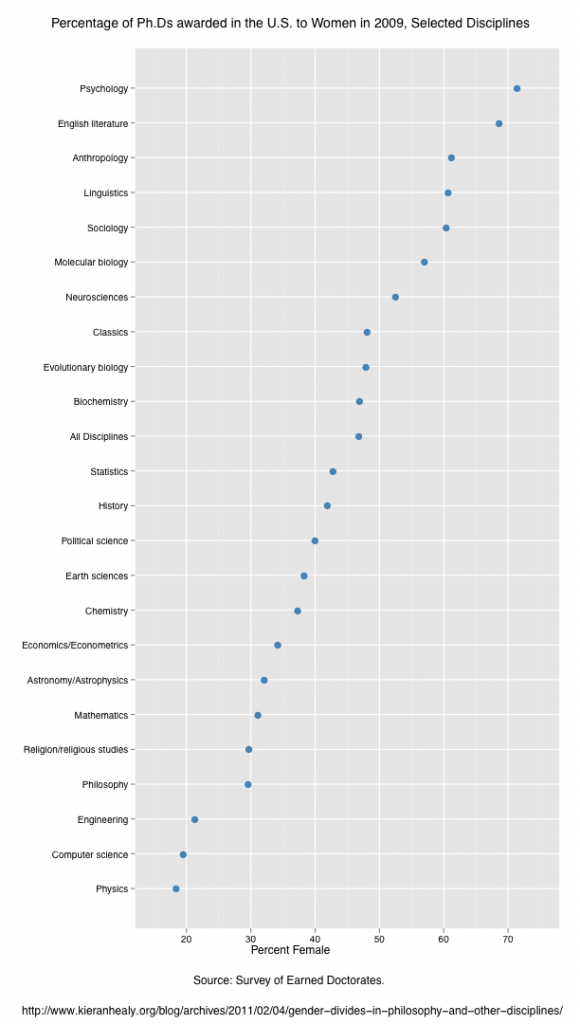What % of PhDs go to women in your discipline?
Subscribe to Blog
Recent Posts
When is War Justified?
October 24, 2022
Conversation with Teny Gross on Gang Violence
October 20, 2022
The 5 reasons wars happen
October 14, 2022
Advanced Master’s & PhDs
September 10, 2022


10 Responses
Because most of us are not trained in anthropology, could S.D. Gottlieb please explain what are these “philosophical phalluses”?
I second O’s question. The biggest surprise in this graph, to me, is definitely the high percentage for statistics PhD’s. I mean, only 30% for math, only 35% for economics, but 45% for statistics? What gives?
As a female undergraduate honors major in Philosophy who ended up with her PhD in Anthropology, I can assure you it’s not just an innate difference in gender. Philosophy, as a discipline, is at its core as appropriate for men and women alike. Yet, I found that the sorts of problems considered were woefully narrow and disconnected from the reality of the world. Hence, I moved to Anthropology, which engages with philosophical thinking, texts, and theories, without the limitations of the “philosophical phalluses.” This is just one contrasting example, but I am intrigued that the two disciplines are so radically disparate, but also completely unsurprised.
The difference in gender ratios between temporary visa holders and citizen/LPR’s and the differing mix of these by field skews the numbers in some cases. Only about 1/3rd of Electrical Engineering PhD’s are citizens or LPR’s. Women are the majority of PHD’s among citizens/LPR’s.
Would be interesting to get the Economics PhDs broken down by sub-field. I suspect that women are almost at parity in development economics – indeed in the recent survey we’ve been running of grad students who are interested in development, 44% of PhD students in years 3+ are female.
I was wondering why we think there is an almost 10 percentage point difference between the proportion of females obtaining PhDs in Economics and Statistics. Specifically, can we tell whether it’s because females are more likely to go into Statistics, or because men are more likely to go into Economics? I just found this:
In 2009, 353 PhDs were awarded in Statistics, of which 151 (42.8%) went to women, whereas 1,121 PhDs were awarded in Economics/Econometrics, of which 383 (34.2%) went to women: Men and women are both more likely to (complete) study (in) Economics, but men are much more likely to do so. Why?
Why the implicit presumption that all fields should be 50% female?
Do we blame psychology’s number on discrimination?
Discrimination against the subject probably….
Interesting that Philosophy is still dominated by men.
I suspect that being a function of mental priorities. Look at the stats, there is a clear distinction between the genders that is not reliant on stereotypes, but rather on physiological differences in how a male and female differ as determined by brain function and hormone influences (to simplify). I am steadfast in believing it is a fallacy to try and force gender neutral equality as long as barriers to entry are removed for either gender to pursue their particular, individual interests.
Mark: it’s important to remember that some of those mental priorities may be influenced by societal biases. However, your point about gender neutrality is right on point. There are differences between men and women, and pretending like there aren’t is really a frustrating quality of many of my fellow “liberals.” It’s about trying to give everyone the same opportunities, not forcing society to conform to some ideal that we have about what is truly “equal.”